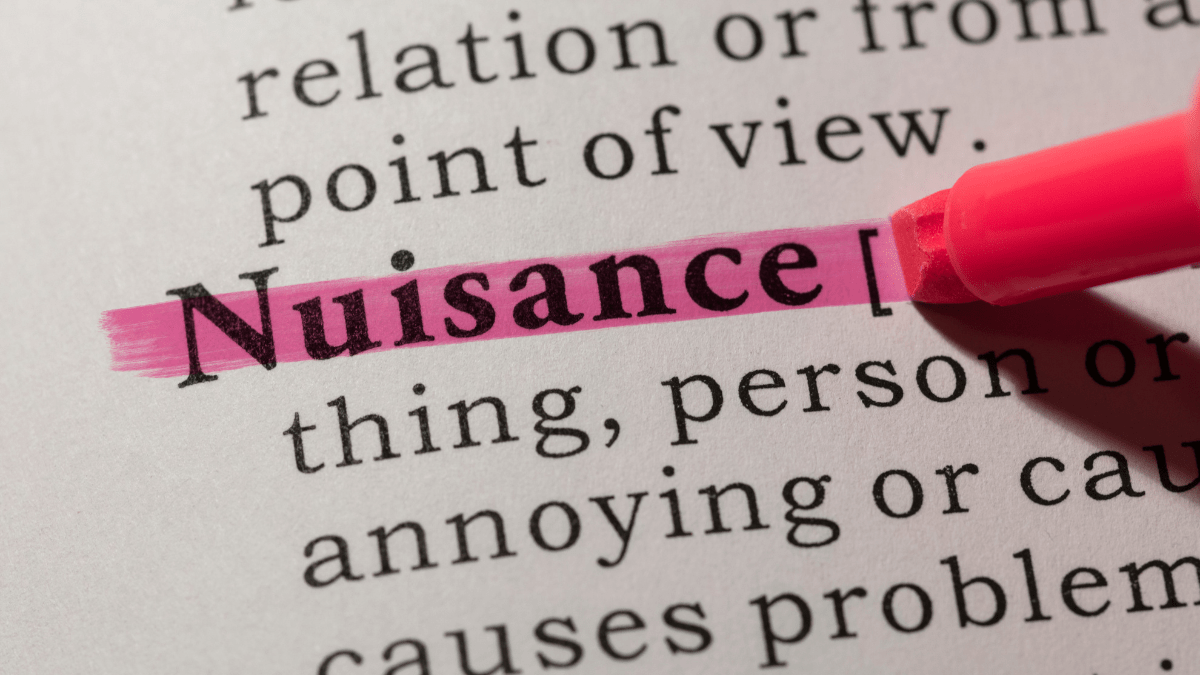Nuisance: When someone owns a property, they have the right to enjoy it without any disruptions, according to the law. However, if someone else’s improper use of their property ends up causing harm or interfering with their enjoyment, it’s considered a nuisance. The term “nuisance” comes from the Old French word “nuire,” which means to harm, hurt, or annoy. In simpler terms, nuisance is like when someone’s actions harm another person’s right to peacefully enjoy their property due to improper use by someone else.
Table of Contents
Definition of Private Nuisance
- According to Stephen, nuisance is anything done to the hurt or annoyance of the tenements of another, or of the lands, one which doesn’t amount to trespass.
- According to Salmond, nuisance consists in causing or allowing to cause without lawful justification, the escape of any deleterious thing from one’s land or from anywhere into land in possession of the plaintiff, such as water, smoke, gas, heat, electricity, etc.
Kinds of Nuisance
- Public Nuisance Tort
- Private Nuisance Tort
Public Nuisance
A Public Nuisance is basically when something gets in the way of everyone’s common rights, making things unpleasant or even breaking the rules. In simpler terms, it’s an action that messes with the whole community or a big part of it and messes with rights people would normally have. So, if something is seriously bothering everyone’s health, safety, comfort, or making things morally questionable, it’s seen as a public nuisance. Think of it like digging a trench that blocks a public path or running a business that stinks up the place – those are examples of things that are a bit too much for the public’s liking.
Essentials of Public Nuisance
A person must have done an act or an illegal omission. Such an act or omission must cause any common injury, danger or annoyance to the public or to the people in general who dwell or occupy the property in the vicinity.
Private Nuisance
When something annoying disrupts a person’s or a company’s rights, it’s labeled as a private nuisance. Unlike a public nuisance, which affects everyone, a private nuisance specifically bothers certain individuals. To fix this problem, you can take legal action by filing a civil lawsuit to claim damages or request an injunction, or maybe even both—no need for criminal charges here!
The Elements of a Private Nuisance Lawsuit
If your neighbor insists on turning their music into a nighttime concert at full blast, it can seriously disrupt your peace and quiet at home. Before diving into legal battles, it’s usually a good idea to have a friendly chat with them. They might not be fully aware of the impact their music is having. If the noise issue persists, you could consider legal action based on the concept of private nuisance. To make a case, you’d generally need to show that you’re the rightful owner or possessor of the property, your neighbor’s actions are genuinely messing with your ability to enjoy your space, and their interference is significant and uncooperative.
Kinds of Private Nuisance
- Damage to Property
- Physical Discomfort
Damage to Property
If your property gets messed up or you’re bothered by something around you, you’ve got a solid reason to take action. This could happen because of factories, construction sites, or other stuff. Like, if there’s smoke, smelly fumes, noisy racket, water causing trouble, gross filth, pesky trees, or unruly animals, you’ve got a legit case to do something about it.
Physical Discomfort
When it comes to feeling uncomfortable, the issue at hand should go beyond the usual way people enjoy their property and significantly disrupt the everyday comforts of human life. For instance, engaging in activities like running a noisy business or blocking sunlight can be considered as causing a nuisance, creating obstacles that affect the quality of life for everyone involved.
Conclusion
Nuisance is a concept that pops up regularly in our everyday lives, and it’s interesting to see how Indian courts have taken inspiration from English principles and common law decisions while also forging their own path with unique precedents. This mix has really expanded the field of nuisance in law, ensuring fairness and the well-being of everyone involved. Whether it’s a private nuisance case where an individual is affected or a public nuisance case impacting society as a whole, the legal system aims to address these issues comprehensively.
Read Also: Strategies to Conquer Your CLAT Exam Within the Time Limit




